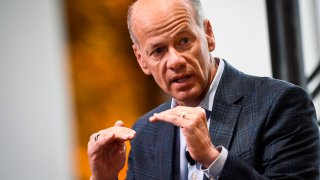
- Records uncovered by CNBC show that in the buildup to Silicon Valley Bank's failure, the firm's then-CEO Greg Becker chaired a trade group called TechNet and was a board member of the Silicon Valley Leadership Group, another technology trade organization.
- Both of those groups list tech giants including Amazon, Apple, Google and Meta as members.
- One took aim at elements of the Dodd-Frank reform bill and the other advocated for cutting corporate taxes
Before Silicon Valley Bank's failure, its former CEO Greg Becker backed two tech industry lobbying groups that tried to influence the Dodd-Frank financial reform law and pushed to cut corporate taxes, according to records reviewed by CNBC.
In the buildup to the bank's collapse, Becker chaired a group called TechNet and was a board member of the Silicon Valley Leadership Group, two trade organizations that have lobbied government officials on a range of issues tied to the firm. Becker stepped down as chairman of TechNet at the start of the year but remained on the group's executive council until Monday, when he resigned.
Both trade organizations included Silicon Valley Bank as a member before its failure, according to archived versions of their websites. Current members of both organizations include tech giants Google, Amazon, Meta and Apple.
Get DFW local news, weather forecasts and entertainment stories to your inbox. Sign up for NBC DFW newsletters.
SVB collapsed under pressure after customers withdrew a staggering $42 billion last week. Days after the bank was forced to close on Friday, regulators backstopped SVB customer deposits as part of multiple moves to contain the damage from its failure. Regulators later appointed Tim Mayopoulos to run SVB.
The lobbying by trade groups linked to Becker and SVB adds to a string of efforts to influence policy that has drawn lawmakers' attention since the bank failed. Some members of Congress have sought more information on the practices that left the bank vulnerable and its push to chip away at regulations, along with Becker's sale of more than $3 million in stock in late February.
Senate Banking Committee member Sen. Elizabeth Warren, D-Mass., sent a letter to the banking executive asking him to "describe the full scope of your efforts to roll back Dodd-Frank regulations in Congress." Warren and other lawmakers are now pointing to the bank's failure as justification to tighten safeguards around the financial industry, including by rolling back a 2018 law that loosened Dodd-Frank rules.
Money Report
When Becker led TechNet, the group piled cash into shaping federal policy — including pieces of Dodd-Frank. The organization has spent more than $2 million since the start of 2020 on lobbying Congress, according to its lobbying disclosure reports.
TechNet spent $1.84 million last year on 20 in-house and external lobbyists, the most it invested in lobbying since 2005, according to data from the nonpartisan watchdog OpenSecrets. The trade group had vast coffers to draw from: it brought in more than $4.2 million in membership dues in 2020, according to its most recent financial disclosure form filed with the IRS.
TechNet focused its lobbying, in part, on "Section 1033 of the Dodd-Frank Consumer Protection Act," according to its disclosure reports. The group engaged with House and Senate lawmakers, as well as Consumer Financial Protection Bureau officials, on the provision related to consumer disclosures, records show.
Steve Kidera, a spokesman for TechNet, told CNBC that the group's "disclosed lobbying on Section 1033 was a consumer data privacy issue related to the announced notice of proposed rulemaking at the CFPB on data privacy, one of our industry's top policy issues."
Section 1033 was established under the sweeping financial reform legislation, which former President Barack Obama signed into law after the 2008 financial crisis.
The CFPB says it is "in the process of writing regulations to implement" section 1033 which would require financial institutions such as Silicon Valley Bank to "make available to consumers, upon request, transaction data and other information concerning a consumer financial product or service that the consumer obtains from the covered entity."
Though the lobbying disclosures do not explain whether TechNet supports or opposes section 1033 as written, the organization clearly wants to have a say in how the rule is implemented.
The group's 2023 policy principles say it wants to establish a "robust consumer data right through a Section 1033 rulemaking that promotes the free flow of consumer authorized data across the financial ecosystem." TechNet added that it supports "a flexible, consent-based framework for notifying consumers of how their information will be shared, transmitted, stored, and utilized."
The other trade organization for which Becker held a board seat has reached into its own deep pockets to influence policy. The Silicon Valley Leadership Group in 2020 raised $1.3 million in contributions and brought in an additional $2.9 million through membership dues, according to the records filed to the IRS.
Its 2021 records, which were provided to CNBC by the organization after an inquiry, shows they brought in almost the same amount in membership dues that year. The group raised over $940,000 through contributions in 2021, according to the records.
The organization boasts on its website that it "supported comprehensive corporate tax reform, including lowering the corporate income tax rate and moving toward a hybrid/territorial international tax system."
The corporate tax rate most recently dropped in 2017. Former President Donald Trump signed GOP tax cuts into law, cutting the rate to 21% from 35%.
Laura Wilkinson, a spokeswoman for Silicon Valley Leadership Group, told CNBC that Silicon Valley Bank executives were part of their group's coalition of dozens of member companies that met with House and Senate lawmakers in 2017 on Capitol Hill to advocate for cutting the corporate tax rate.
"We're focused on strengthening competitiveness by fighting for a fair business tax system at the local, state, and federal levels," Wilkinson said. "In 2017, this included joining the broad coalition of main street businesses and innovation leaders that advocated for a simpler and fairer tax system as part of comprehensive tax reform to support economic growth and American jobs."
Federal records show that the Silicon Valley Bank Leadership Group has not filed lobbying disclosure reports since 2009.
Becker was chairman of the Silicon Valley Leadership Group from 2014 through 2017, according to an archived version of his SVB bio page. Becker could not be reached for comment.
SVB and Becker back Democrats
Even as it pursued policy goals that sometimes clashed with Democrats' priorities, SVB and Becker often gave money to the party's candidates for office.
One of Becker's big donations in the 2022 election cycle went to Senate Majority Leader Chuck Schumer, D-N.Y., according to Federal Election Commission filings. Schumer is giving the contributions his campaign received from both Becker and the bank's PAC to charities.
Since 2011, the year Becker became CEO and president of SVB, its political action committee has given the majority of its donations in each election cycle to Democrats, according to OpenSecrets. The exception came in 2012, when Republicans maintained control of the House even as Obama won reelection.
Senate Banking Committee member Sen. Mark Warner, D-Va., also received contributions from Becker. Warner received $11,400 from the ex-bank CEO over the course of the 2020 and 2022 election cycles, according to Federal Election Commission records. Sen. Jon Tester, D-Mont., received $3,000 from the bank's PAC in 2017, according to FEC records.
Becker also hosted Warner for a fundraiser in 2016 at his California home, according to an invite to the gathering. Representatives for both Warner and Tester will not say whether they plan to donate any of the funds they received from Becker or the bank's PAC.
The veteran lawmakers voted for the 2018 law that rolled back pieces of Dodd Frank.
The bill they backed reclassified the "too big to fail" standard under Dodd Frank, which came with enhanced regulatory scrutiny. By raising the regulatory threshold for banks from $50 billion in assets to $250 billion, medium-size banks were exempted from those regulations. Becker, in testimony he submitted to a Senate panel in 2015, made a similar call for his and other medium sized banks to be exempt from the Dodd Frank regulations.
The Federal Deposit Insurance Corporation, which helped form the protections for SVB depositors, said before the bank closed that the company had approximately $209 billion in total assets — which would have made it subject to those rules before 2018.






